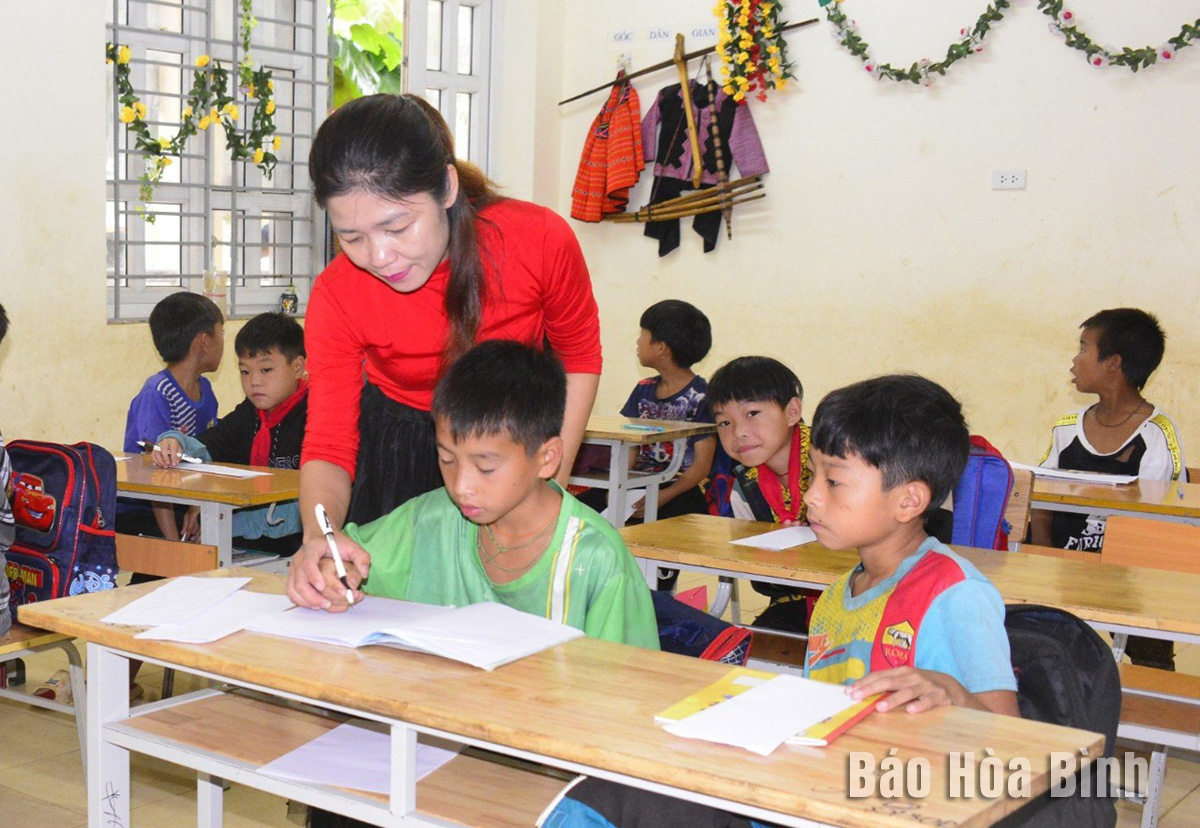



The education work in the areas of the ethnic minorities in the province is paid attention to. The photo taken at Hang Kia Primary and Secondary School (Mai Chau).
The two communes, Hang Kia and Pa Co (Mai Chau), used to be the complex areas with drug problems and many socio-economic difficulties. In 2010, the Provincial Party Committee issued Project No. 03-DA/TU on consolidating and improving the effectiveness and efficiency of the political system, socio-economic development, and ensuring the national defense and security in 2 communes (Project No. 03). After more than 10 years of implementation, the important results have been achieved. The province is continuing to implement the next phase of the project (Project No. 09) to improve the people's lives, associated with ensuring the national defense and security in the two communes.
The province has focused on directing the integration of investment resources in socio-economic infrastructure, supporting the people in the two communes to develop production... Up to now, the transport, school, health care, and electricity infrastructure have been completed basically to better meet the requirements of socio-economic development. In particular, the route of Cun Pheo - Hang Kia, Pa Co, connecting National Highway 6 has been put into operation; building a kindergarten in Pa Co commune, renovating the high and secondary school in Hang Kia commune... The people have enjoyed the social security policies. To date, the rate of the poor households in Hang Kia commune has decreased to 29.43%, and that in Pa Co commune has reduced to 32.03%.
Halfway through the implementation of the National Target Program on reducing poverty sustainablyy for the period 2021-2025, the province has achieved the positive results. The poverty reduction continues to be identified as one of the important and priority tasks in the province's socio-economic development. The province has effectively implemented the central and provincial policies on supporting sustainable poverty reduction. In particular, they have been focusing on directing the effective implementation of the policies to support production development and social policy credit, creating jobs, and increasing income for the poor; Supporting to increase the people's access to the basic social services such as tuition support policies, health insurance premiums, electricity bills, housing support, and clean water.
Particularly, the province has mobilized, integrated, and effectively used the resources to serve the goal of poverty reduction, in which, along with state resources, it is necessary to mobilize a variety of non-state resources; Assigning the agencies and units to support and help the poor communes in the province effectively. The results of reviewing the poor and near-poor households at the end of 2021 (according to the multidimensional poverty standard for the period of 2022 - 2025), the multidimensional poverty rate in the whole province is 26.14%. Of which, there are 34,029 poor households, accounting for 15.49%; there are 2,388 near-poor households, accounting for 10.65% of the households in the province. By 2022, the poverty rate was 22.32%....
Although the Sustainable Poverty Reducing Program has achieved encouraging results, the province still has the poor districts; The level of the shortage of the basic social services is still high, especially the remaining poor households, most of whom belong to the social protection target group, have serious illnesses, are unable to work, and have difficulty reducing the rate of poor households in the following years.
Through measuring the index of the lack of the basic social services, there are over 18,800 poor households lacking jobs in the whole province; Over 19,000 poor households lack medical care; 4,130 poor households lack education; Nearly 16,700 poor households lack housing; Over 18,500 poor households lack clean water and environmental sanitation; Nearly 11,000 poor households lack access to information.
To try to reduce the rate of the poor households in the entire province according to the multidimensional poverty standard for the period of 2021 - 2025 of 2.5% (from 12.29% at the end of 2022 to 9.79% at the end of 2023), in the coming time, the province will continue to thoroughly grasp and propagate to raise awareness about sustainable poverty reduction. In particular, it is necessary to focus on synchronously implementing poverty reduction mechanisms and policies, promoting activities to support the poor and the near-poor household, the newly escaped poverty households and the ethnic minorities. It is also necesary to continue to build and replicate livelihood models, ensuring that 100% of the poor, near-poor, and newly escaped poverty households are in need and eligible to receive preferential credit loans; 100% of the poor and near-poor households are supported to have health insurance. It is suggested to effectively implement the component projects of the Sustainable Poverty Reducing Program in 2023; Reviewing and classifying the poor and near-poor households ensuring accuracy, fairness, and not omitting the subjects; Decentralizing, empowering, creating initiative for the grassroots, ensuring the improved efficiency of investment resources, prioritizing the focused investment, focusing on especially difficult areas.
It is necessary to ensure the principles of democracy, openness and transparency when implementing. It is important to strengthen inspection, examination, supervision and evaluation of implementation at all levels and sectors. The central and provincial policies on supporting sustainable poverty reduction need to be implemented in the province. It is also important to mobilize, integrate, and effectively use the resources, promoting propaganda to change awareness and arouse the will to proactively escape poverty.